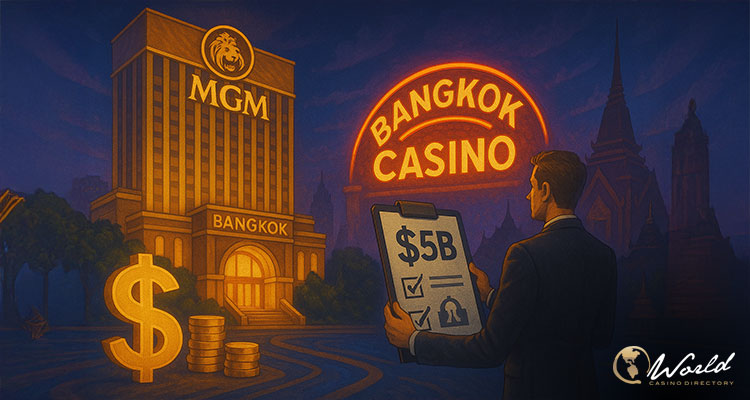MGM Resorts International has expressed strong interest in establishing a multi-billion-dollar integrated casino resort in Bangkok, but its commitment hinges on Thailand implementing a supportive tax regime and permitting domestic access to gambling facilities. With early investment estimates ranging between US$3 billion and US$5 billion, the U.S.-based gaming giant is positioning itself as a key stakeholder should Thailand legalize casino resorts under the proposed entertainment complex framework.
Fair casino taxation crucial for investment:
Ed Bowers, president of global development at MGM Resorts, emphasized the need for Thailand to adopt a competitive tax structure if it wishes to attract top-tier operators. “Integrated resorts not only have a significant impact on economies and tourism, but they also help to eliminate existing problems related to gambling,” he said in an interview with the Bangkok Post.
Citing examples across Asia, Bowers pointed to Singapore’s relatively moderate casino tax—an average of 17% on gross gaming revenue—as a successful benchmark. In contrast, higher tax regimes in Macau (40%) and Japan (30%) create greater financial strain on operators. MGM believes Thailand would benefit from staying closer to the Singaporean model to ensure investor interest and long-term sustainability.
According to Bangkok Post, a previous draft from a Thai parliamentary committee proposed a 17% gaming tax, but the figure remains tentative. Bowers urged authorities to finalize policies with close consultation from operators to ensure alignment between legislative goals and business viability.
MGM’s call for local access is grounded in regional precedents where restrictive policies have led to disappointing financial results. Bowers referenced South Korea as a case study, where casinos, except for one, are off-limits to locals. He highlighted the struggles of Incheon’s INSPIRE Entertainment Resort, reportedly up for sale due to underperformance linked to its limited customer base.
Thailand, he argued, should avoid similar pitfalls. Reasonable entry rules for residents would help casinos reach critical mass and generate consistent revenue. Bowers also commented on Japan’s ¥6,000 (approximately THB 1,400) local entry fee as a fair threshold that Thailand could adopt.
The executive also urged regulators to avoid overly burdensome financial conditions, including a THB 50 million deposit requirement for local players, which remains under review. Excessive thresholds could deter potential customers and investors alike.
Location and design considerations favor Bangkok:
Among the shortlisted cities for Thailand’s entertainment complex rollout—Bangkok, Chon Buri, Chiang Mai, and Phuket—MGM’s clear preference is the capital. Bowers stated that Bangkok’s international appeal, high population density, and established infrastructure make it ideal for hosting one or possibly two integrated resorts, depending on scale.
He added that MGM prioritizes areas with proximity to airports and iconic settings that naturally attract global tourists. The company typically designs properties with 5–10% of total area reserved for casino space—a standard in line with Thailand’s proposed 10% cap. Bowers called this restriction “reasonable,” especially when compared to Japan’s 3% limit and Singapore’s sub-5% allocation.
Responding to criticism surrounding the social risks of legalized gambling, Bowers defended integrated resorts as a controlled, regulated environment better suited to manage these issues. “It is essential governments understand the fundamentals of how the casino business works,” he stated, emphasizing that policies should be grounded in operational realities, not just public sentiment.
He added that revenue generated from casinos can fund education, support programs, and responsible gambling initiatives—tools that help mitigate potential harms. MGM, which is also developing a resort in Osaka set to open in 2030, typically prioritizes job creation and local economic upliftment as part of its international expansion efforts.
Thailand’s potential entry into the integrated resort landscape arrives at a time when regional competition is intensifying. According to Deputy Finance Minister Julapun Amornvivat, at least four global casino giants, including MGM and Wynn Resorts, have initiated talks with Thai officials, signaling widespread interest in the market.



